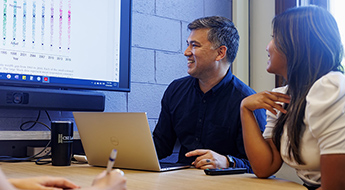Michael Kraus
Professor of Psychology
Morton O. Schapiro IPR Faculty Fellow
Michael Kraus is a social psychologist who specializes in understanding the psychological processes—the affective states, motivations, and relational strategies—that maintain and perpetuate dimensions of societal inequity. His research has examined this topic through a variety of research methods that involve controlled laboratory and field experiments, attitude surveys, ethological observations, and psychophysiological and nonverbal assessments of group interactions.
Kraus is a leading expert in the social psychology of inequality and a fellow of the Society for Experimental Social Psychology, the Association for Psychological Science (APS), and the Society for Social and Personality Psychology (SPSP). He has received awards for outstanding research through the APS Rising Stars program, the SPSP Sage Young Scholars Award, and the Committee for the Study of Socioeconomic Status at the American Psychological Association. He has also received an award for outstanding mentorship in the social sciences from Yale University.
Before arriving at Northwestern, he was an undergraduate psychology and sociology major at the University of California, Berkeley, and later, a doctoral student in social psychology. Kraus has held appointments as a visiting scholar at the Russell Sage Foundation, an associate professor in organizational behavior at Yale University, and an assistant professor of social psychology at the University of Illinois, Urbana-Champaign.
Current Research
Japanese redress and Asian American support for Black reparations. Informational interventions can shape policy attitudes, and in this study published in Communications Psychology, Kraus and his colleagues examined whether largely unknown information about past reparations payments toward one minoritized group would shape current policy judgments. In 1942, the U.S. government wrongfully relocated and imprisoned more than 120,000 Japanese Americans. In 1988, the government apologized and offered $20,000 in reparations payments. Japanese American redress is a recent, but not widely known, concrete example of communities who have successfully fought for reparative economic action. In two preregistered studies of online crowdsourced panels of Asian Americans (N = 329, N = 500), an intervention that raised awareness of this history of incarceration and redress increased support for reparations for Black Americans, relative to a control condition, and national polling data on support for reparations. Preliminary analyses revealed that the degree of learning about Japanese American redress in the intervention explained its impact on support for Black reparations. Future research should target representative samples to understand how education about past redress within one’s own social group affects support for reparative economic justice for others.
Informational interventions and the Black–White wealth gap. An intervention study, published in the Proceedings of the National Academy of Sciences, exposed a U.S. community sample to messages about Black-White racial inequality. Interventions including data bearing on Black–White wealth inequality elicited higher estimates of that inequality that persisted for at least 18 months, aligning with federal data measuring the Black-White wealth gap. The data interventions also increased acknowledgment of White Americans’ structural advantage and reduced beliefs in personal achievement as the remedy for racial inequality. In contrast, a narrative-based intervention, including information on a single Black family contending with racial inequality, did not shift inequality estimates or change respondents’ explanations. This study suggests how social science data can be used to create more realistic perceptions of racial inequality—a prerequisite to enacting equity-enhancing policy.
Selected Publications
Kraus, M., D. Sanji, M. Burns, I. Cha-Ju, A. da Silva Frost, A. Vinluan, L. Hollie, and C. Dupree. 2025. The psychology of inequality as domination and resistance. Nature Reviews Psychology 4: 669–79.
Torrez, B., C. Dupree, and M. Kraus. 2024. How race influences perceptions of objectivity and hiring preferences. Journal of Experimental Social Psychology 110: 104524.
Torrez, B., C. Dupree, and M. Kraus. 2024. Objectivity interrogation of racial scholarship in psychology and management. Scientific Reports 14(1): 1–11.
Figueroa, D., J. Parker, J. Hunger, M. Kraus, K. Muscatell, and A. J. Tomiyama. 2024. Social class stigma and poorer health behaviors: evidence from the eating in America study. Social Science & Medicine (1982) 347: 116765.
Tan, J., C. Tan, and M. Kraus. 2024. Subjective socioeconomic status moderates how resting heart rate variability predicts pain response. Affective Science 5(2): 1–8.
Torrez, B., L. Hollie, J. Richeson, and M. Kraus. 2024. The misperception of organizational racial progress toward diversity, equity, and inclusion. American Psychologist 79(4): 581–92.
Park, J., M. Burns, and M. Kraus. 2023. A psychological approach to living wages. PsyArXiv. doi:10.31234/osf.io/kds9c.
Kraus, M. and A. Vinluan. 2023. Reminders of Japanese redress increase Asian American support for Black reparations. Communications Psychology 1: 33.
Callaghan, B., Q. Delgadillo, and M. Kraus. 2022. The influence of signs of social class on compassionate responses to people in need. Frontiers in Psychology 13: 936170.
Kraus, M., B. Torrez, and L. Hollie. 2022. How narratives of racial progress create barriers to diversity, equity, and inclusion in organizations. Current Opinion in Psychology 43: 108–13.
Park, J., P. Vani, S. Saint-Hilaire, and M. Kraus. 2022. Disadvantaged group activists’ attitudes toward advantaged group allies in social movements. Journal of Experimental Social Psychology 98: 104226.
Callaghan, B., Q. Delgadillo, and M. Kraus. 2022. The influence of signs of social class on compassionate responses to people in need. Frontiers in Psychology 13.
Kraus, M., S. Hudson, and J. Richeson. 2021. Framing, context, and the misperception of Black–White wealth inequality. Social Psychological and Personality Science 13(1): 4–13.
Dupree, C. and M. Kraus. 2021. Psychological science Is not race neutral. Perspectives on Psychological Science 17(1): 174569162097982.


